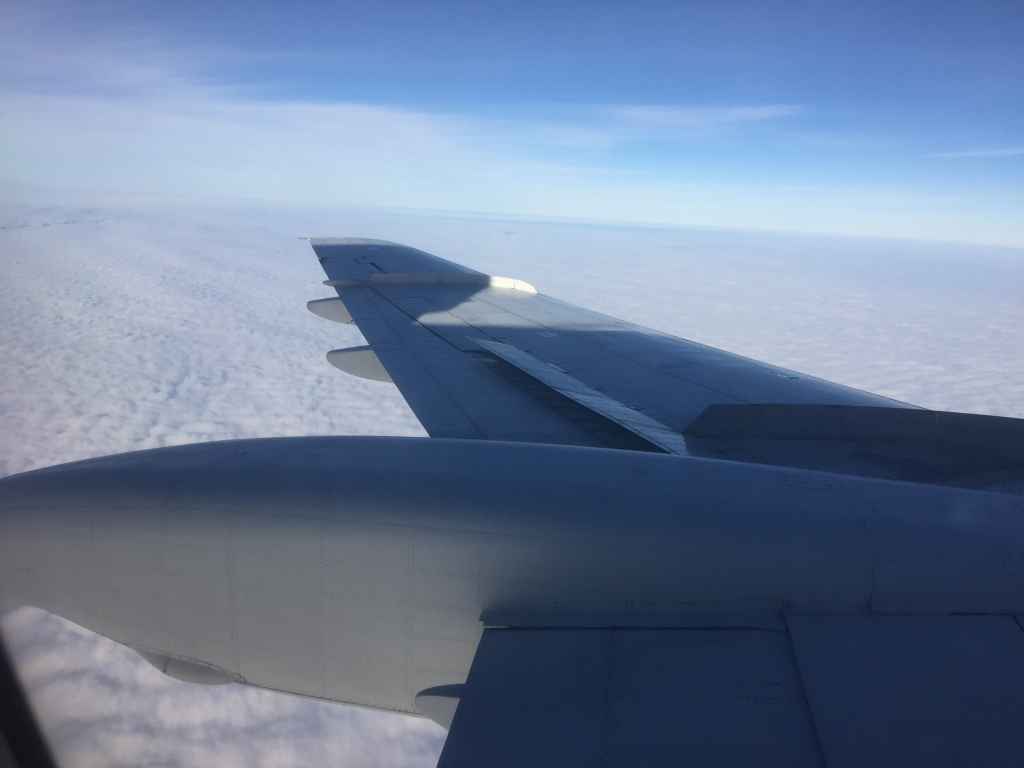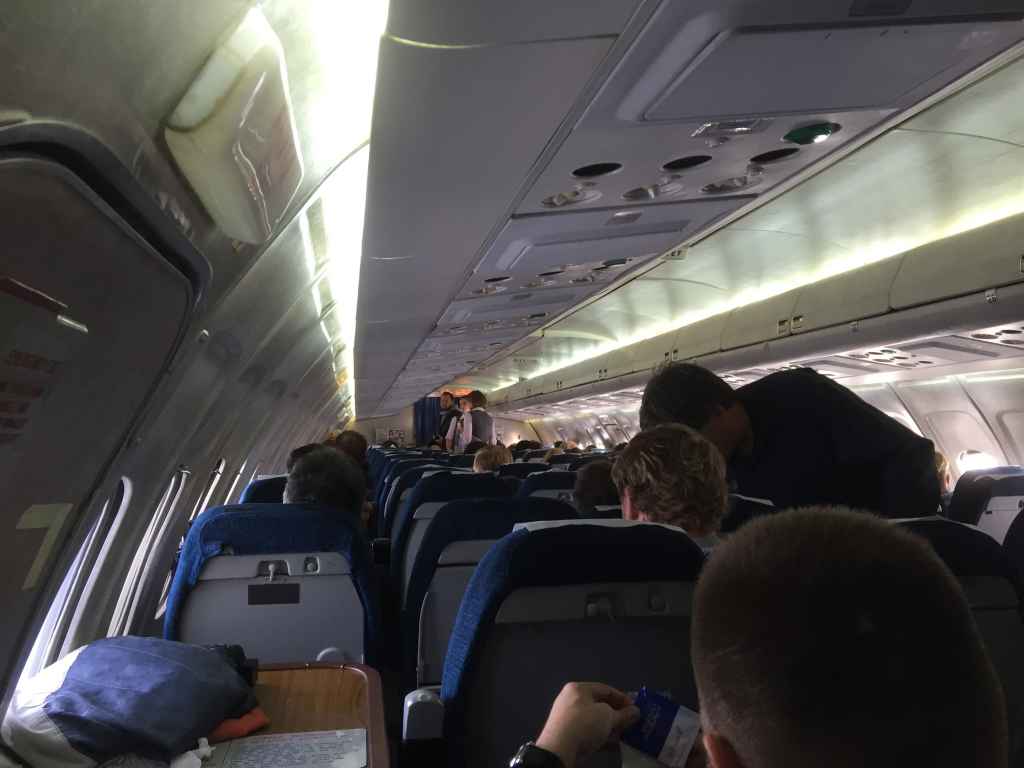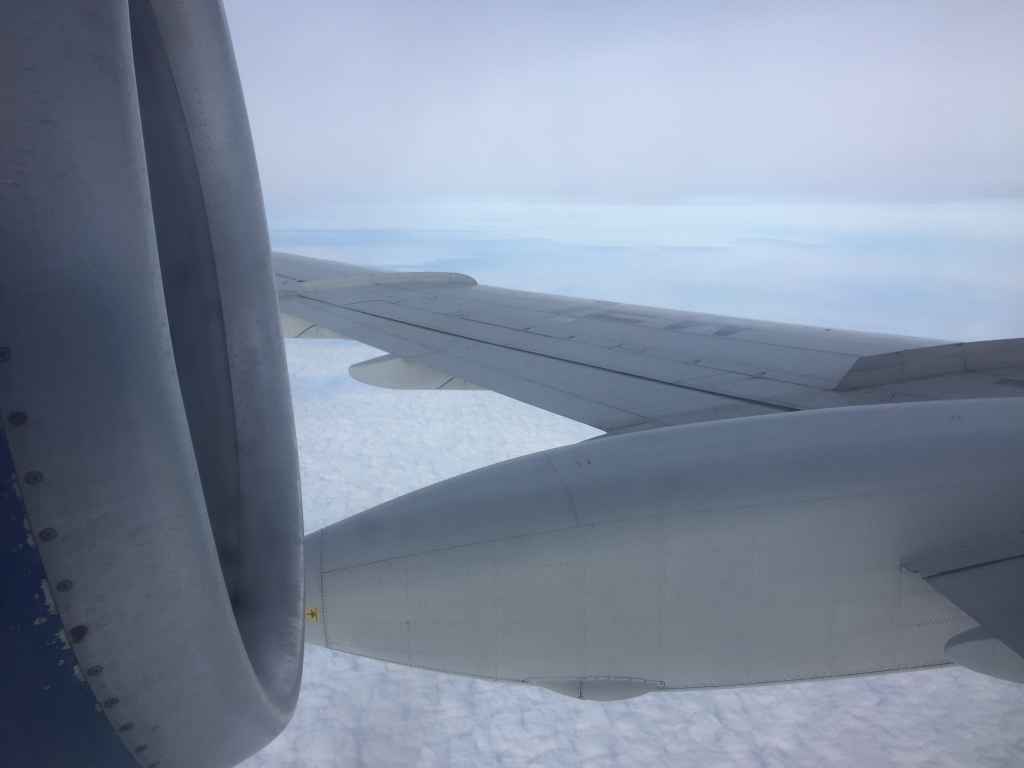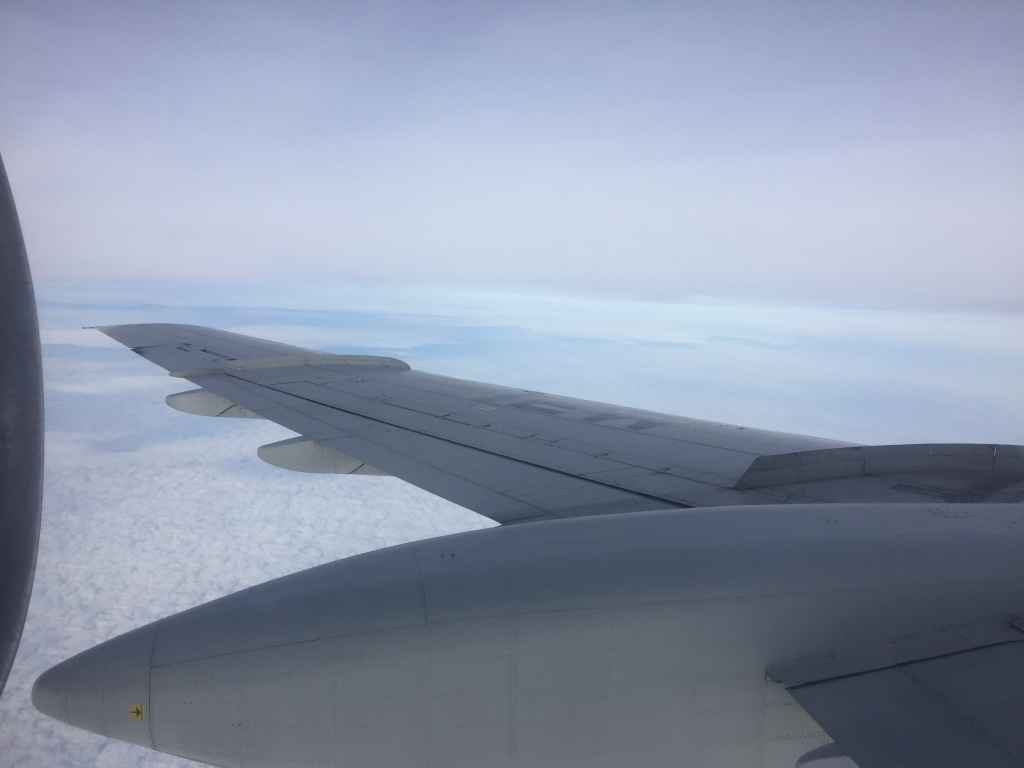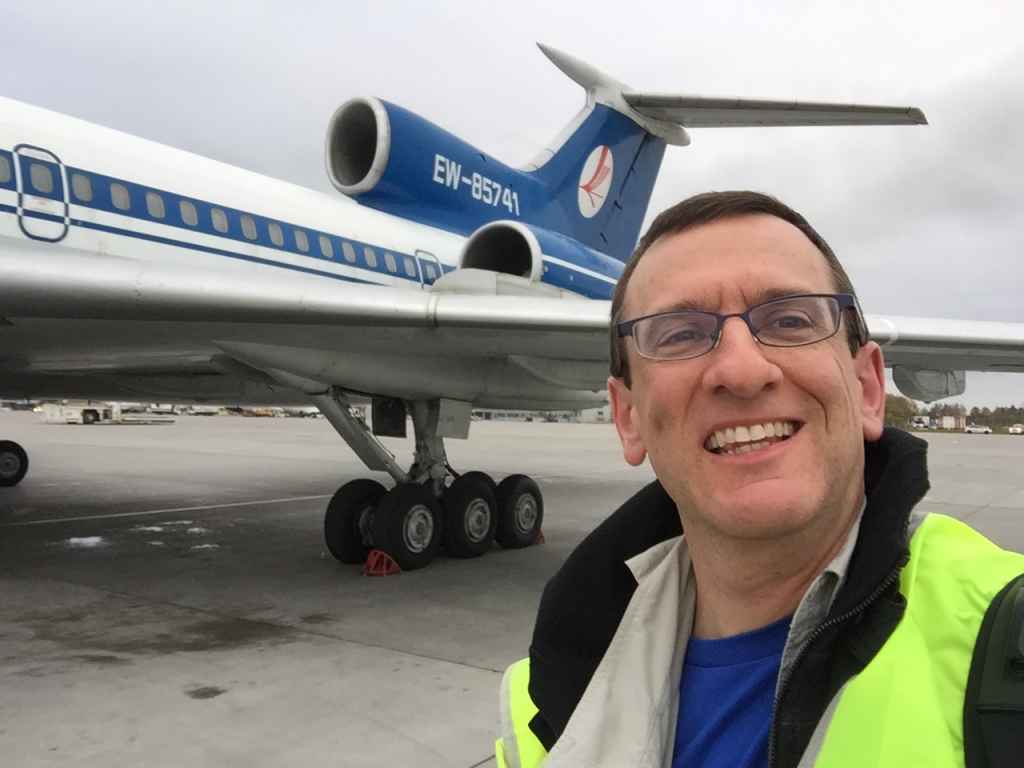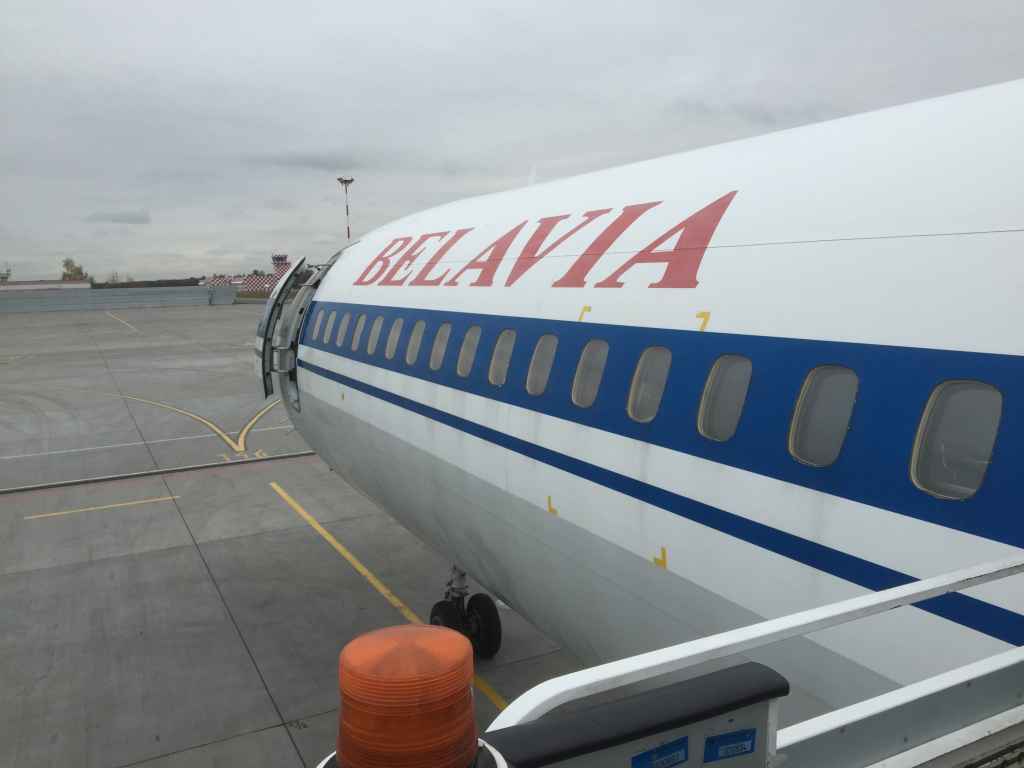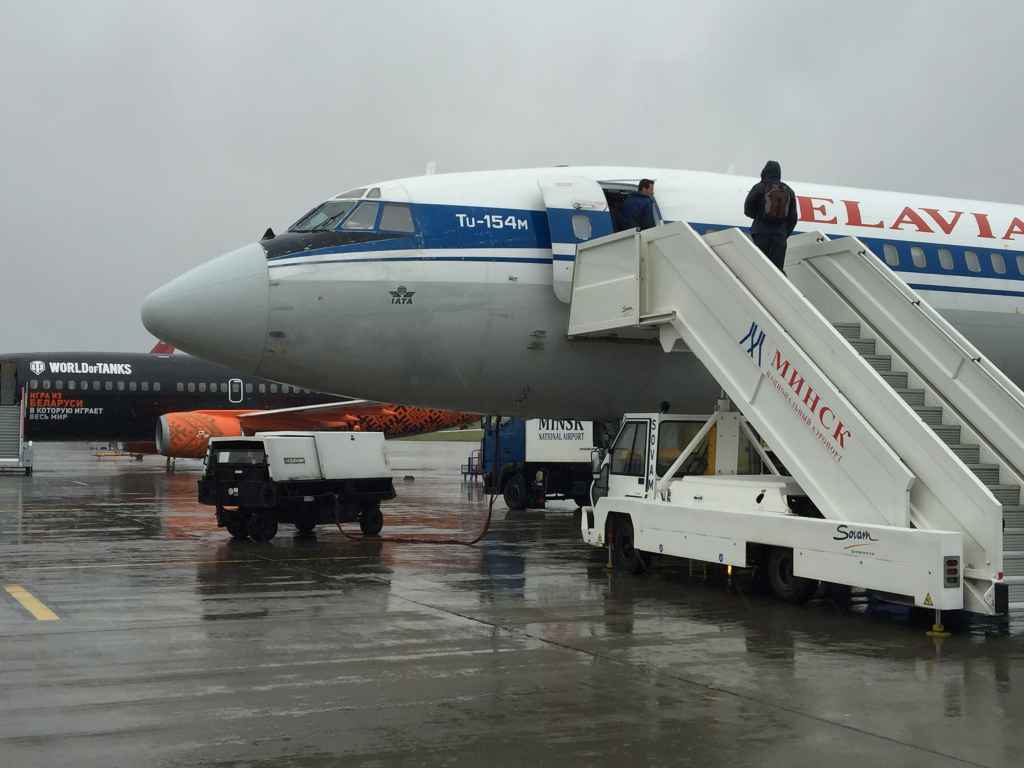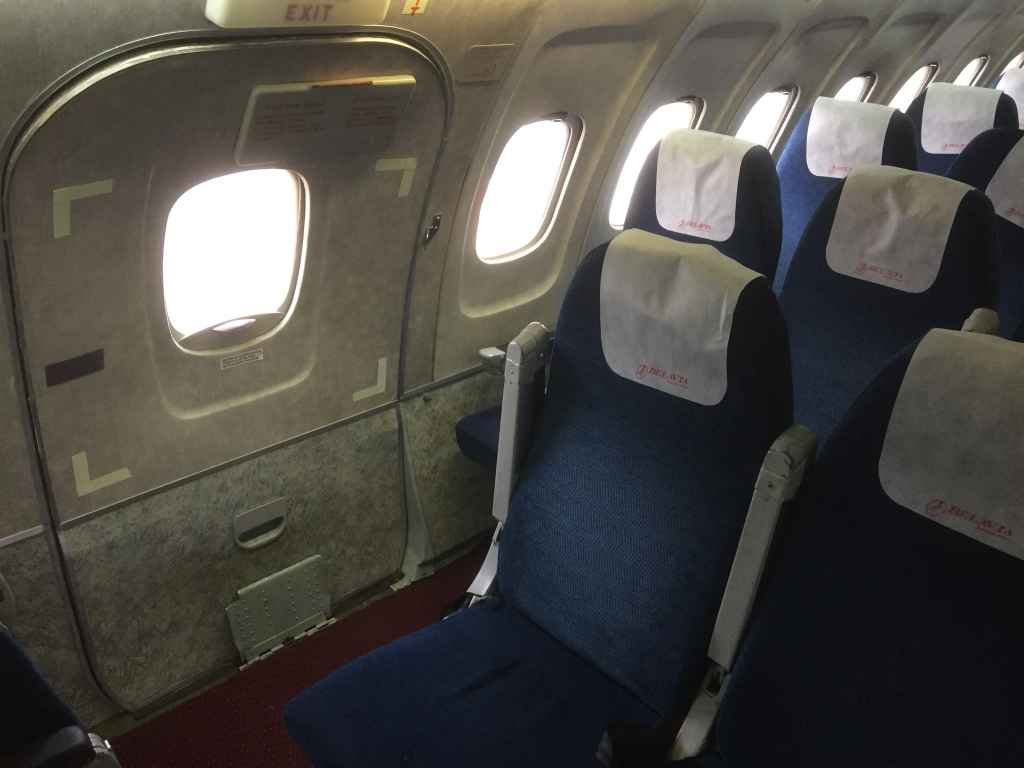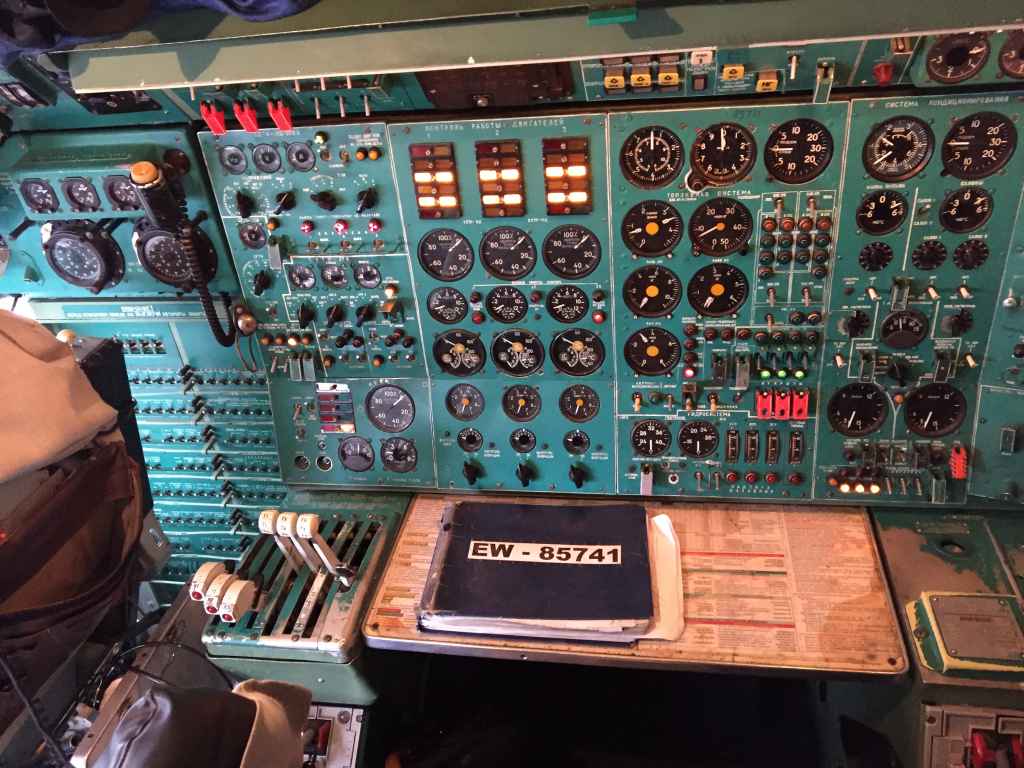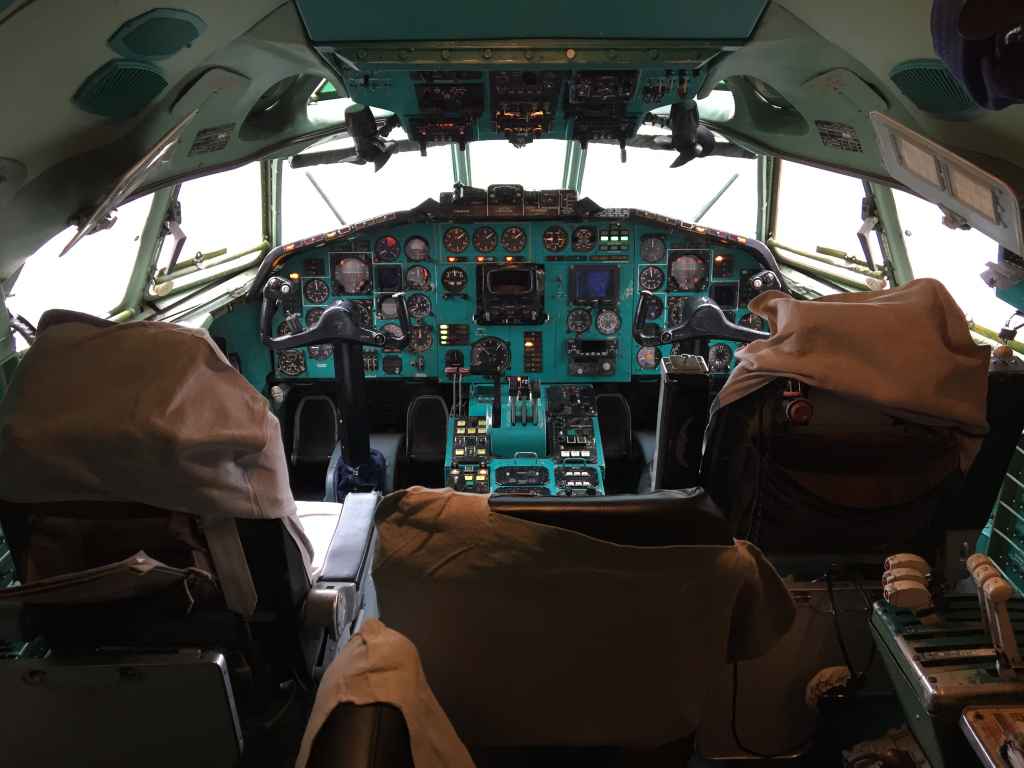Belavia Tupolev Tu-154 Final Phase Out – End of an Era
Airliner World Magazine
February, 2017
Story and photos by Henry Tenby

The Tupolev 154 looks the business from any angle. Her tail is all power. No plastic airplane here my friends. I could fly these aircraft all day long. What a muscular machine this is.
For fans of Russian aviation, October 9, 2016 marked a major milestone when the last ever scheduled flight of a Tupolev Tu-154 took place, bringing an end to 44 years of scheduled airline service for the reliable, classic Russian tri-jet.
Belarus national airline Belavia operated their one and only operational Tu-154M EW-85741 on their scheduled route between Minsk 2 and Saint Petersburg, and the special flight was attended by a group of international aviation enthusiasts who travelled to Minsk as part of a special “final farewell tour” arranged by Boris Vlassov of Paris based Merlin Tours.
The Tupolev Tu-154 first flew in 1968, and was first delivered to Aeroflot in 1970, and entered scheduled passenger service with the Soviet Sate airline in 1972. Some 1,025 examples were manufactured with the most recent delivery being to the Russian Defense Ministry in 2013. Aeroflot was the main operator of the Tu-154, which operated the airline’s medium to long haul services from the early 1970s to the mid-1990s, when western types first started to appear in Russian skies in response to escalating fuel costs. The Aeroflot Tu154 fleet peaked in the early 1990s as Tu-154M has been in mass production since 1984, and the Aeroflot fleet stood at 652 Tu-154s (including 112 M models), according to JP Fleets. When the Soviet Union broke apart in the late 1980s, many of these aircraft were transferred to the newly created local airlines of the former CIS states.
Looking back from today, Belavia and other CIS and Eastern European carriers operated Tu-154s on scheduled and charter routes spanning back many decades, however between the mid 2000s and 2016, their numbers dwindled rapidly down to Belavia’s one remaining example. The Tu-154 jetliner was reliable, well-built, and well-suited to the harsh winters and operational demands of the region. As second hand Boeings and Airbuses became more available at reduced prices, the drab Western types replaced the venerable Tu-154 fleets of Eastern Europe. And the Tu-154 is now a rarity.
Merlin Tours put word out of this specific tour in the summer, which was coupled with joy rides on other classic Russian types at Minsk, with the AN-12, Yak-40, AN-26, AN-140, AN-30, AN-2 and the gigantic Mil-26 monster helicopter also featuring on the itinerary. Aircraft availability for such tours cannot always be assured due to maintenance and operational factors, and the loss of the AN-12 and a date change for the Tu-154 final scheduled flights were factors the tour participants had contend with in deciding to attend the 3 day tour.

Iryna Baranava, Olga Sikorskaya, and Boris Vlassov of Merlin Tours at Minsk 2 Airport main terminal building departures level.
Two pervious Merlin Tours also featured the Belavia Tu-154, one being the last ever scheduled flight of a Tu-154 into Western Europe, which operated A Belavia scheduled service from Geneva. And the other from Warsaw. However in both instances, the aviation tour participants were only able to sample the one inbound sector to Minsk on the Belavia Tu-154 as part of their tour. This year’s tour was unique in that the tour participants were able to fly two live sectors on the Tu-154, the outbound and return flight back to Minsk.
About 35 of the 40 participants on the tour opted to attend the Belavia farewell Tu-154 flights, which required a Russian visa, even though the passengers would be in transit at Pulkovo airport in Saint Petersburg. The cost of the Russian transit visa processed for the author in Ottawa was a very steep $250, probably due to the currently frosty relations between Canada and Russia. The transit visa costs for Europeans was only 35 Euros. That said, many wondered why a visa was even required in the first place when the Minsk – Saint Petersburg Pulkovo flight is considered a “domestic” flight for the local passengers.
Sunday, October 9, 2016, started with a very early group meeting in our hotel lobby. The tour participants were told to meet in the lobby of the Hotel Yubileiny at 0600 am where boxed breakfasts were presented and busses departed at 0630 am precisely for the one hour ride to Minsk 2 airport. It was a dark and very cold morning, punctuated with very heavy torrential rain, which endured through most of the day. Arrival at Minsk 2 was met with the first light of day, and with our boarding passes distributed in advance, the group passed very quickly and efficiently through security to the gate area. Given that it was an early Sunday morning flight, we were surprised that the flights were pretty much fully booked in both directions.

That’s our flight: Belavia flight 941 to Saint Petersburg, boarding at 0800 am for an 0830 am published departure time. This is Belavia’s last ever Tupolev 154 scheduled service, marking the end of a very long era for the type, and the airline. A group of 40 hard-core airline buffs assembled in Minsk that weekend to partake in these last ever Belavia Tu154 flights as part of a special tour arranged by Merlin Tours.
Even though it was lashing down rain, the group was happy the Tu-154 was not parked on a gate which an airbridge, thus we were relieved to know we would be bussed to the aircraft so that would board via the airstrairs. Boarding the aircraft on the ramp would allow for a lot better photo and video opportunities than via an airbridge. At 0815 the bus delivered our group to the waiting Tupolev, and as most of the group selected seats in the rear cabin to savour wing and engine views, and the fabulous harmonics of the Soloviev D-30KU engines, we were last to board.
The airstairs could only accommodate a handful of passengers at a time due to weight limits, and with the rain teaming down by the bucketful, we took shelter from the harsh elements under the wing of the aircraft. Which provided an excellent opportunity for photography that was appreciated by all. This allowed for detailed shots of passengers boarding on the airstairs, and signature T-tail shots of the Tupolev classic.

World famous Russian aircraft fan Michael Reich from Switzerland, under the wing of the Belavia Tu154 seeking shelter from the rain before boarding. Michael is also a DPRK Air Koryo regular!

Pissing with rain while boarding Belavia Tu154 at Minsk. Destination .. Saint Petersburg. A pleased as punch Henry Tenby savours the moment in the lashing rain by taking an iPhone selfie.

“Aviation Fanatics Seek Refuge from the Elements under Wing of Classic Russian Jetliner.” Now that’s a photo caption!

As it was chucking it down during our boarding, many of the aviation fans took refuge from the elements under the wing of the Belavia Tu154, to let other passengers board in a non rushed manner. Standing under of the wing of a Tupolev 154 prior to an active service is not something one gets to savour every day! Hence the abundance of cameras!

The mighty Tupolev 154! Holding her own on the soaked-to-the-skin apron at Minsk. Prior to departure for Saint Petersburg.
Merlin tours made the brilliant decision to invite our Flight Attendants to join us at the special buffet dinner the night before, held at a lovely restaurant a short walk from the hotel in central Minsk. This gave us an opportunity to meet our Flight Attendants and vice versa, and they volunteered they were ok to be filmed on the flight. So it was nice to be welcomed by familiar faces as we boarded the warm and cozy Tu-154 from the harsh elements for our Belavia flight B2 941, the last scheduled Tu-154 departure from Minsk.

Non aviation fans board the Belavia Tu154 on the saturated Minsk apron for Belavia flight 941 destination Saint Petersburg (LED) on the morning of October 9, 2016. Our scheduled departure time was 0830 so this photo was probably taken just after 0800 am. A fabulous way to spend a Sunday morning! (You can tell these are non aviation fans as there are no cameras!)
Seated in 25A provided a fabulous view of the Tu-154 trademark landing gear fairings and even the engine, and the chiseled, rivet lined features of wing. Engines were started at approximately 0825 am, and the fabulous alarm bell ring of the three Soloviev engines was music to the ears for the aviation fanatics onboard who made the effort to attend this amazing event.
We were lucky as on both flights we enjoyed long taxis to and from the active runway, which gave the added joy of savouring the engine sounds of the classic Russian tri-jet. Lined up on Minsk’s runway 31, throttles were advanced to take-off power at 0845, and even though the Tupolev was full, we climbed into the saturated morning air with minimal effort amidst a fury of thunder and crackle from the Tupolev’s engines. Passengers on the right side of the aircraft were briefly treated to a view of the aircraft parking stands and terminal building before we quickly disappeared into the very low cloud base.

Another wing view from seat 25A on Belavia Tu154 last ever sked service (Minsk-Saint Petersburg-Minsk on October 9, 2016).

View through the window from my seat 25A as we climbed through the clouds up to our cruising altitude outbound from Minsk. This photo was probably taken about 10 minutes after take-off.

View from my seat 25A looking forward. Note the two overwing exit rows at mid cabin. These would also be good seats, with extra noise as a bonus due to the old seals of the emergency exits.

Can’t get tired looking at Tupolev 154 cabin views, this time from the rear lavs looking forward, about 15 minutes after departure from Minsk.

Once we got to cruise we had time to explore the cabin of the Belavia Tu-154. This selfie was taken at the very back row near the lavs. That’s Boris Vlassov from Merlin Tours on the left, and one of our Flight Attendants in the centre.
After about ten to fifteen minutes we reached our cruising altitude in the relaxing sunshine above the clouds and the fasten seatbelt sign was switched off. Several of the aviation fans then politely left their seats to come to the back of the rear cabin to take photos of the unique bathrooms aboard the aircraft, and for the obligatory cabin and rear engine/wing view photos, while savouring the much louder engine sounds in the rear cabin.
This was a very civilized affair, with the regular passengers and the flight attendants being most accommodating and understanding. Even though the flight attendants had to perform their inflight duties of serving drinks and a small meal from their service trolley (which needed to be transported up and down the aisle), everyone had plenty of opportunity to get their photos without the stress of being rushed. Several participants were able to visit the flight deck, and even more would have accepted the invitation if the flight was not so short in duration.

View through the window in the emergency door at row 30. it is a very unique view that can only be a Tupolev 154 .. or a Tu134.

Henry Tenby savours the extra leg room and sweet sound of the engines at cruise, aboard Belavia Tu154 from Minsk to Saint Petersburg. Very last row in the house.

There is no window in the very last row of the Tupolev 154, but you do get a lovely amount of leg room to the emergency door, and fabulous sound qualities. It is a very good place to spend some time when flying on a Tupolev 154.

This photo gives a pretty good view of the set up in the very last row of a Tupolev 154. You get loads of leg room, lots of noise (specially if the seals are weak on the emergency door) .. and if you stretch forward you can use window in the emergency door.

Forward looking cabin view on the Belavia Tu154 from row 31. The cabin was a bit tired for her years, but everything was clean and in good working order.

As shown in this photo, the actual emergency door exit is at row 30 on the Belavia Tu154, and the very last row is one behind at row 31. Row 30 only has seats BC and DE (A and F have been removed so as not to interfere with emergency door exit procedures).

This is the view seated on the last row seat 31A. WIth seat 30A removed there is loads of leg room. But it is a rather long stretch to access the window for photos and filming. Note that seat 29 has the cabinet of the slide raft between the chair and window, and this makes for a very interesting setup for camera etc.
We only had about 30 minutes at cruising altitude before we commenced our decent to St. Petersburg. At this time, I sat back in my seat having nicely explored the rear cabin, and was seated by a well dressed local gentleman in his mid 30s, who spent the duration of the flight on his computer. He asked about the special occasion and why our group was taking so many photos.
Having explained that an international group of aviation fans had assembled in Belarus for these final scheduled flights of the Tu-154, he smiled in approval. As is often the case when flying on classic jetliners, the locals are typically oblivious to the fact that they are travelling on a special aircraft, and these flights were no different in that regard.
After a flight duration of exactly one hour we touched down at Saint Petersburg Pulkovo airport at 0945 am, under cloudy but dry conditions. After enjoying an extended taxi to our remote parking position, the tour participants donned yellow high visibility vests, which were issued to us back at the hotel, so officials could identify our group and expedite our arrival and departure formalities without delaying the outbound departure of the flight.
Given the tight turnaround times for the aircraft, it would be impossible for a regular passenger to have arrived on the inbound flight, and departed on the outbound flight from Saint Petersburg as there was simply not enough time. Our quick turnaround was only made possible by special advanced arrangements put in place with the authorities and Belavia by Merlin Tours.
All the regular passengers deplaned the aircraft and our group waited until they were off, and then we deplaned as a group. We were permitted to quickly take our apron shots of the aircraft before boarding the bus, but time was very short. First we had to be processed through customs and security as arriving passengers, then we had to hustle upstairs to the departure level and go through security again as departing passengers.
Belavia had wisely pre boarded all the Saint Petersburg originating passengers. An apron passenger bus then transported our entire group out to the waiting aircraft, where again we were allowed to quickly take our photographs. The airstairs were positioned at the centre cabin door, so the flight attendants opened the forward cabin door and were waiving at us for the photos, as was the Captain from his open cockpit window. This was a very nice touch, which was well appreciated.

Henry Tenby poses for an iPhone selfie while at the top of the boarding stairs in Saint Petersburg, Russia. We’re boarding the Belavia Tu-154 for the last sked flight of this type. End of an era!

The rugged features of the Tupolev Tu15 are evident in this study of the upper wing to body intersection. I just love the Tu-154. What a fabulous machine!

Aviation freak nirvana: The crew of the Belavia Tu-154 observe the aviation fans filming away as they board the aircraft for the type’s last ever sked service departing Saint Petersburg, back to home base at Minsk.

Study of gear, flaps and slats as the Belavia Tu154 sits at rest on the Saint Petersburg apron. Our Tupolev was pretty much the only remaining Yeoman Soviet classic on the field that day. Sterile, plastic western types of sadly permeated the Russian scene. What a sad state of affairs.

All the non aviation fans were already on board the aircraft, and then the group of aviation fans were brought out to the aircraft. We were allowed to line up and take shots on the ramp before boarding. A special thanks to the Russian authorities at Saint Petersburg for allowing this. It made for a lot of happy visitors to Russia! Notice the Captain waiving in the cockpit window.

Nice nose study of the Belavia Tu154 on the Saint Petersburg apron, prior to departure back to Minsk.
Well deserved credit goes to Merlin Tours and Belavia for making the necessary arrangements in Saint Petersburg that helped expedite the efficient turnaround of our group. There were a few hiccups but it was largely successful, and their efforts made the impossible possible.
For the return flight B2 942 back to Minsk, I was seated in 26F, beside two local young men who were to pass the time playing games on their phones, and sleeping. Clearly they were oblivious and uninterested in the proceedings! The cabin of our 1991 build Tu-154M was looking rather tired, but given its 25 years of service, in a tough environment, one could say it stood the test of time quite successfully. The seats were comfortable, the seat pitch was adequate, there were no broken seat belts, air vents, lights, arm rests, table trays, or bathroom accessories. Something you cannot say when flying on a 777 or A330! So the Russian’s built a good product in the Tu-154. And most importantly, the windows were in excellent condition, with minimal marks, and very few scratches or abrasions. This allowed for excellent filming and photography through the windows.

On the apron at Saint Petersburg. Flaps set for take-off. We’re about to taxi off stand for the generous taxi to the runway. The Tu154 is one hell of a lovely aircraft. And this view is the money shot of wing views.
Exactly one hour after our touch down at Saint Petersburg were starting engines at 1045 am. The Saint Petersburg Pulkovo ramp was filled with a sterile selection of western aircraft, and it was an honour to be aboard the one and only Russian built passenger carrying classic, in mother Russia. After another lengthy ten minute taxi, we were lined up on the runway and throttles were advanced to take-off power at 1100 am. The cloud base was a lot higher than at rain-soaked Minsk, so we enjoyed a better and clearer take-off with more to see than our Minsk take-off.
The return flight to Minsk was pretty much a mirror of the outbound flight. The aviation fans were free to leave their seats to explore the cabin at cruising altitude, and everyone was very careful to not get in the way of the flight attendants. They again performed their duties while being fully cooperative and understanding of the aviation fans. On both flights the very last row 31 was un-occupied, so it was possible to relax in these seats and savour the noise. And this was a good location to take photos of the cabin (without blocking the aisle) and through the window viewing the engine and very unique sight of the trailing wheel-bogie fairing. In addition to stretching out one’s legs with the very generous leg room at row 31!

I can watch this view all day long! The classic, penultimate Tu-154 wing view. Beats the pants off any Airbus of plastic Boeing or Embraer. As seen from seat 26F.

Unique window view on board the Belavia Tu-154 en route between Saint Petersburg and Minsk. Taken from the last seat in the house. Which was actually not occupied.

Rear cabin as viewed looking forward from the rear lavs. We’re at cruise between Saint Petersburg and Minsk.

Note the little table that covers the emergency raft and slide at rows 30/31. This is a nice place to be when flying on a Tupolev 154.

Row 31 seat E beside the rear emergency door on the Belavia Tu-154. Although one seat removed from the side wall, it is still an excellent seat for punters, due to the amazing sound quality and fab engine and wing views.

The blokes beside me decided to sleep away their time on the last ever Belavia Tu154 sked service back to Minsk from Saint Petersburg. They were completely oblivious. Silly sods.

Belavia Tu154 cabin view looking forward from my seat 26F inflight on our way back to Minsk. Pretty close to a full house.
One tour participant from Canada was suffering from a cold and decided to stay in his seat for the duration of the flight. So he stayed in his seat and savoured a nice hot cup of coffee. He noted that the coffee was actually served hot instead of at tepid bathtub temperature as is the case on many other airlines. This small service detail was something that made the flight that more comfortable.
Meanwhile back at Minsk, the atrocious weather conditions persisted with heavy rain and very low ceiling. After a decent through what seemed like never ending cloud, we broke through the cloud base just short of the threshold and touched down at 1205, with a magnificent reverse thrust and blast of water clouds from the runway. Our Tu-154 gripped the runway firmly holding the centre-line with an iron first. The Tu-154 is a heavy aircraft, and seemed to endure inclement weather better than lighter weight current day aircraft. It was interesting to be able to sample the ample capabilities of the Tu-154 in her true element. For the return sector we enjoyed an air time of 65 minutes from Saint Petersburg.
After rollout the cabin windows quickly obscured with rain drops, and our flight attendant welcomed us to Minsk, without mention of the special occasion, being that this flight B2 942 was Belavia’s last ever scheduled Tu-154 service, marking the end of a thirty three year unblemished record of reliable service with the airline. The cabin broke into applause, and there were at least 35 smiling faces in attendance that memorable morning.
Much to our surprise, as we entered the remote parking stand at Minsk, the airport fire department provided a water cannon salute over the aircraft, which very nicely cleaned the cabin windows for perfect viewing lasting just long enough for us to taxi onto our parking stand and shut down engines.

View from my seat 26F just as we pulled into position on the parking stand beside a 737-300 logo jet of Belavia.
All the regular passengers deplaned while our group remained on the aircraft, where we were able to speak with the crew and photograph to out heart’s content. Those who wanted were able to photograph the cockpit, and the Flight Engineer (a young fellow and keener) positioned the aircraft’s log-book labeled EW-85741 on the Flight Engineer’s desk specially for our photos. Some noted that the green paint used in the cockpit is the same green paint used in the cockpits of Russian military aircraft. As a group we were leisurely allowed to exit the aircraft and take exterior photos from apron, or from the shelter of the waiting bus. Thus marked the end of an era for very well designed, robust, reliable, Russian built classic.

Forward economy cabin on the Belavia Tu-154 looking aft. All the aviation fans sat in the rear cabin to sample to superior noise quality.

We were very lucky and pleased that the last Tu-154 flights operated from the open ramp instead of an enclosed jetway.

The lines of the Tu-154 are unique and pleasing to the eye. Note the cargo ramp at Minsk in the background.
Belavia’s two other retired Tupolev Tu-154s were parked at their Minsk maintenance base, in company with the Belarus Government Tu-154, which of course remains active. So what awaits the future for EW-85741? Apparently, Belavia have a few charters to Siberia booked for the aircraft in the next few months, and it will be available as a back-up aircraft.
On October 13, the aircraft positioned to Gomel in Eastern Belarus, where it operated a charter to Surgut in Central Russia. Apparently, Belavia also has a handful of charters to Siberia booked for the aircraft over the next few months. But the Tupolev is running out of hours as an overhaul is due, and the aircraft is expected to be permanently retired in the next few months. As is the case with many Russian aircraft, her engines are owned and leased from a third party, in this case being Aeroflot, and the engines will go back to Aeroflot upon retirement.
As of today, approximately 40-50 Tu-154s are believed to remain in active service. For the aviation fan looking to fly on a Tu-154, there is essentially only one option available: join an aviation tour to the DPRK and have a joy ride on an Air Koryo Tu-154 (two of which are believed to remain operational). The other operational Tu-154s all belong to government agencies within Russia and former CIS States.
A very special thanks must go to the Belavia flight attendants for being so helpful and accommodating to the group. Their efforts made for a very special experience that is truly rare in this day and age. Very special thanks are extended to Belavia for allowing this special aviation event to happen with their special cooperation. And special thanks to Boris Vlassov, Olga and Iryna of Merlin Tours for having the tenacity and patience to organize this amazing, once-in-a-lifetime event.

